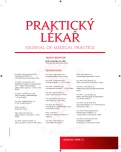Molecular mechanisms of anti-cancer treatment resistance in prostate tumours
Authors:
M. Raudenská 1; J. Balvan 1; J. Gumulec 1; M. Sztalmachová 1; H. Polanská 1; V. Adam 2; M. Stiborová 3; T. Eckschlager 4; R. Kizek 2; M. Masařík 1
Authors‘ workplace:
Masarykova univerzita, Brno
Lékařská fakulta
Ústav patologické fyziologie
Přednostka: prof. MUDr. Anna Vašků, CSc.
1; Mendelova univerzita v Brně
Ústav chemie a biochemie
Vedoucí: doc. RNDr. Vojtěch Adam, Ph. D.
2; Univerzita Karlova, Praha
Přírodovědecká fakulta
Katedra biochemie
Vedoucí: doc. RNDr. Miroslav Šulc, Ph. D.
3; 2. lékařská fakulta Univerzity Karlovy a Fakultní nemocnice Motol
Klinika dětské hematologie a onkologie
Přednosta: prof. MUDr. Jan Starý, DrSc.
4
Published in:
Prakt. Lék. 2014; 94(2): 88-93
Category:
Of different specialties
Overview
There are few problems more frustrating and depressing to oncologists and cancer patients alike than anti-cancer have treatment resistance. It comes in two varieties: primary and acquired. More and more cancers become responsive to newly developed therapies that are successful in inducing responses in cancers previously considered intrinsically resistant, and the emphasis gradually moves on more and more problematic acquired types of resistance. Acquired resistance may arise through many types of mechanisms. One of them is a constitutive activation of NF-κB, which has been described in a great number of solid tumours and this activation appears to support cancer cell survival and to reduce the sensitivity against chemotherapeutic drugs. Additionally, some anticancer therapies induce this transcription factor themselves and through this mechanism lower their own efficiency. In some cases, a first cycle of an anti-cancer treatment may select resistant population of tumour cells that subsequently leads to recurrence of disease and to the failure of treatment. This may be particularly true for tumours that are composed of a heterogeneous population of cells, which is exactly the case of prostate tumours. Tumour progression needs a positive and reciprocal feedback between cancer associated fibroblasts (CAFs) and cancer cells. Cancer cells induce and maintain the fibroblasts activated phenotype (activated transcription of certain genes), which produce a series of growth factors and cytokines that sustain tumour progression by promoting extracellular matrix (ECM) remodelling, cell proliferation, angiogenesis and epithelial-mesenchymal transition (EMT). A thorough understanding of chemoresistance pathways and how they interact would facilitate two important outcomes. Firstly, identifying patients who will not benefit from chemotherapy prior to their exposure will avoid unnecessary toxicity and allow them to move on to alternative treatment options. Secondly, targets for further drug development may also arise.
Keywords:
anti-androgen resistance – signal pathways – mechanisms of chemoresistance – radioresistance – metallothionein – NF-κB – PTEN – p53 – cancer associated fibroblasts (CAFs)
Sources
1. Abate-Shen C, Shen MM. Molecular genetics of prostate cancer. Genes Dev 2000; 14(19): 2410–2434.
2. Arlt A, Schafer H. NF kappa B-dependent chemoresistance in solid tumors. Int J Clin Pharm Ther 2002; 40(8): 336–347.
3. Cole SPC, Bhardwaj G, Gerlach JH, et al. Overexpression of a transporter gene in a multidrug-resistant human lung-cancer cell-line. Science 1992; 258(5088): 1650–1654.
4. Dehm SM, Tindall DJ. Alternatively spliced androgen receptor variants. Endocr Relat Cancer 2011; 18(5): R183–R196.
5. Ishizaki F, Nishiyama T, Kawasaki T, et al. Androgen deprivation promotes intratumoral synthesis of dihydrotestosterone from androgen metabolites in prostate cancer. Scientific Reports 2013; published online Mar 25.
6. Kypta RM, Waxman J. Wnt/beta-catenin signalling in prostate cancer. Nat Rev Urol 2012; 9(8): 418–428.
7. Lee JT, Steelman LS, McCubrey JA. Phosphatidylinositol 3'-kinase activation leads to multidrug resistance protein-1 expression and subsequent chemoresistance in advanced prostate cancer cells. Cancer Res 2004; 64(22): 8397–8404.
8. Li F, Sethi G. Targeting transcription factor NF-kappa B to overcome chemoresistance and radioresistance in cancer therapy. BBA-Rev Cancer 2010; 1805(2): 167–180.
9. Ostman A. The tumor microenvironment controls drug sensitivity. Nat Med 2012; 18(9): 1332–1334.
10. Raudenská M, Šmerková K, Tanhäuserová V. a kol. Metalothionein a jeho role v detoxikaci téžkých kovů a predispozici k chorobám. Prakt. Lék. 2012; 92(6): 322–326.
11. Shaikh IAA, Brown L, Schofield AC, et al. Docosahexaenoic acid enhances the efficacy of docetaxel in prostate cancer cells by modulation of apoptosis: the role of genes associated with the NF-kappa B pathway. Prostate 2008; 68(15): 1635–1646.
12. Sissung TM, Baum CE, Deeken J, et al. ABCB1 genetic variation influences the toxicity and clinical outcome of patients with androgen-independent prostate cancer treated with docetaxel. Clin Cancer Res 2008; 14(14): 4543–4549.
13. Sun Y, Campisi J, Higano C, et al. Treatment-induced damage to the tumor microenvironment promotes prostate cancer therapy resistance through WNT16B. Nat Med 2012; 18(9): 1359–1368.
14. Verras M, Brown J, Li XM, et al. Wnt3a growth factor induces androgen receptor-mediated transcription and enhances cell growth in human prostate cancer cells. Cancer Res 2004; 64(24): 8860–8866.
15. Wang G, Wang J, Sadar MD. Crosstalk between the Androgen Receptor and beta-Catenin in Castrate-Resistant Prostate Cancer. Cancer Res 2008; 68(23): 9918–9927.
Labels
General practitioner for children and adolescents General practitioner for adultsArticle was published in
General Practitioner

2014 Issue 2
- Advances in the Treatment of Myasthenia Gravis on the Horizon
- Hope Awakens with Early Diagnosis of Parkinson's Disease Based on Skin Odor
- Memantine in Dementia Therapy – Current Findings and Possible Future Applications
- Memantine Eases Daily Life for Patients and Caregivers
- Possibilities of Using Metamizole in the Treatment of Acute Primary Headaches
-
All articles in this issue
- Poverty
- Allergic bronchopulmonary aspergillosis
- Up-to-date radiotherapy for prostate cancer
- Discussions on ethical issues of medicine and health care as an integral part of teaching ethics to medicine students
- Assessment of fitness to work at night
- Laxatives – safe and effective
- One year experience with dependence degree assessment for the purpose of care allowance
- Molecular mechanisms of anti-cancer treatment resistance in prostate tumours
- Premature ejaculation
- General Practitioner
- Journal archive
- Current issue
- About the journal
Most read in this issue
- Assessment of fitness to work at night
- Laxatives – safe and effective
- Allergic bronchopulmonary aspergillosis
- Up-to-date radiotherapy for prostate cancer
